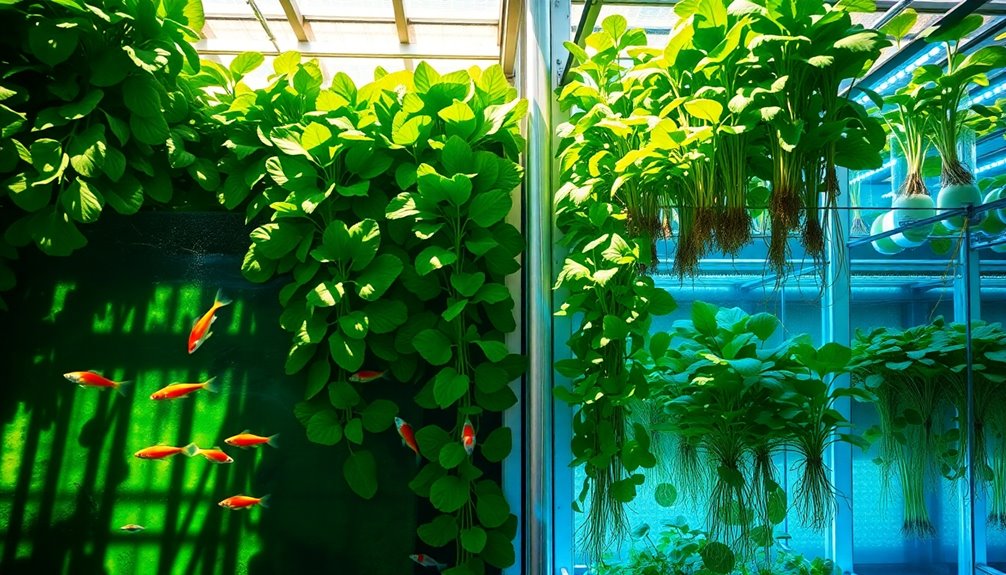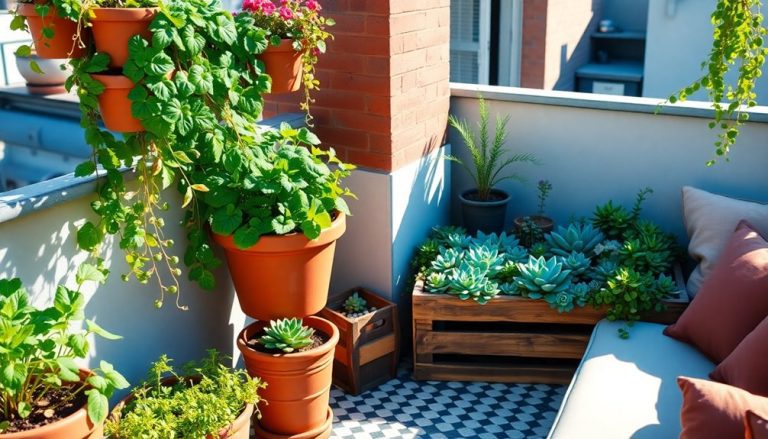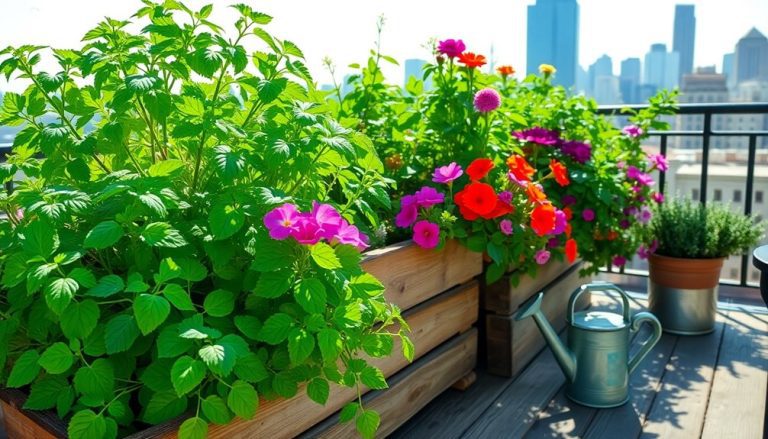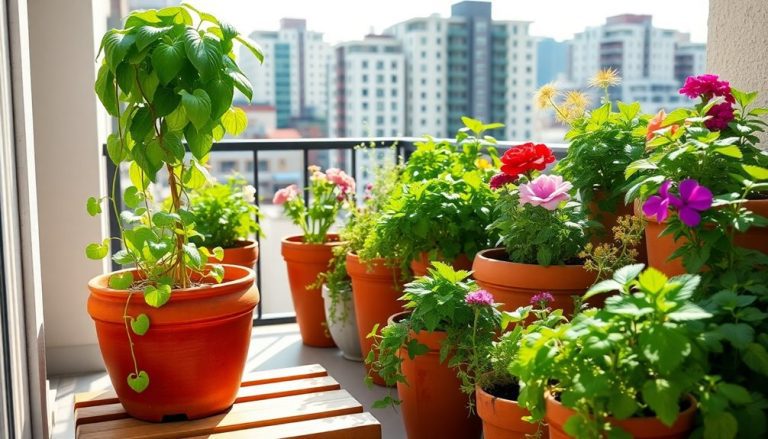When you're deciding between aquaponics and hydroponics, think about your space, budget, and what you want to grow. Aquaponics combines fish farming and plant cultivation, creating a sustainable ecosystem, but typically requires more space and a higher initial investment. Hydroponics, on the other hand, focuses solely on plants and can be more efficient in smaller areas with lower startup costs. Both methods offer benefits like reduced water usage and faster growth rates. Ultimately, it depends on your personal goals and resource availability. Stick around to explore the advantages of each system and find the best fit for you.
Key Takeaways
- Aquaponics integrates fish farming and plant growth, while hydroponics focuses solely on soil-less plant cultivation.
- Choose aquaponics for a sustainable system that provides both fish and vegetables; hydroponics for faster crop yields.
- Hydroponics is ideal for smaller spaces, whereas aquaponics requires more area for both fish tanks and plants.
- Consider initial costs: aquaponics has higher startup expenses due to fish care and system complexity compared to hydroponics.
- Evaluate your long-term goals: aquaponics promotes ecological balance, while hydroponics maximizes plant production efficiency.
Overview of Aquaponics
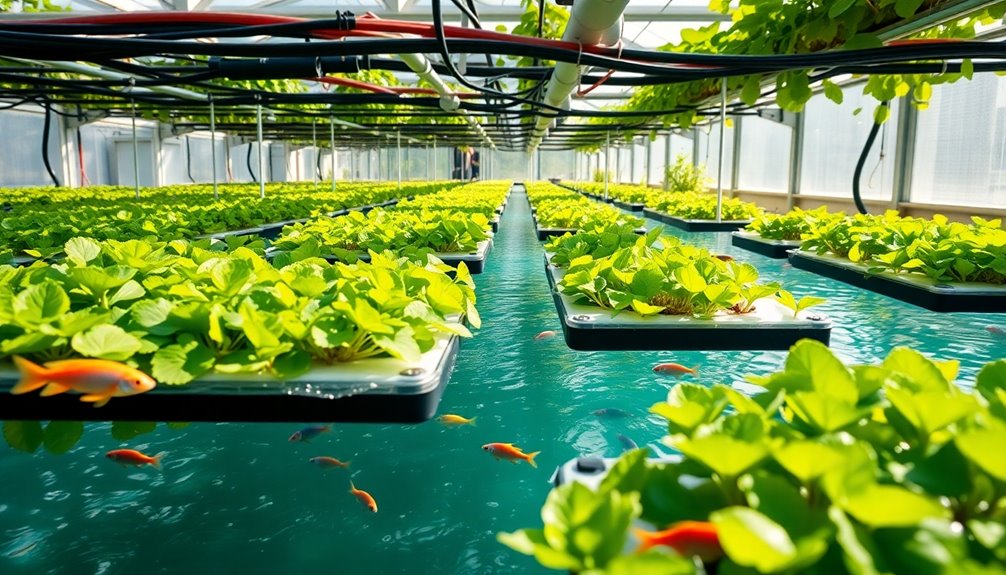
Aquaponics is an innovative and sustainable farming method that combines aquaculture and hydroponics. In this system, you raise fish and plants together in a symbiotic environment. While the fish produce waste, it gets converted into nutrients for the plants, which in turn help filter and clean the water, creating a balanced ecosystem. You don't need to rely on synthetic fertilizers, making it an environmentally friendly option. Additionally, this method relies on hydroponic nutrient solutions, which can further enhance plant growth.
Setting up an aquaponics system can be as simple or complex as you want. You can start small with a home setup or go big with commercial applications. You'll need fish, like tilapia or goldfish, and plants, such as lettuce or herbs. Regular maintenance, including monitoring water quality and feeding the fish, is essential for success.
One of the biggest advantages of aquaponics is its efficiency. You can grow food in less space and use significantly less water compared to traditional farming. Furthermore, with the right hydroponic solutions, you can enhance the growth potential of your plants and optimize your setup.
Plus, you get fresh fish and vegetables from the same system! With its sustainable approach, aquaponics can be a rewarding way to grow your own food and contribute to a healthier planet.
Overview of Hydroponics
Hydroponics, a soil-less growing method, allows you to cultivate plants directly in nutrient-rich water. This innovative technique eliminates the need for soil, enabling you to grow plants in controlled environments. By using various systems, like nutrient film technique or deep water culture, you can optimize growth and resource use. Drip irrigation systems can further enhance water efficiency by delivering precise amounts of nutrients directly to the plant roots. Additionally, using quality plant food is essential to support the health and growth of your hydroponically cultivated plants.
Here's a quick comparison of common hydroponic systems:
| System Type | Description |
|---|---|
| Nutrient Film Technique | A thin film of nutrient solution runs over plant roots, providing oxygen and nutrients. |
| Deep Water Culture | Roots are submerged in oxygenated nutrient solution, promoting rapid growth. |
| Ebb and Flow | Nutrient solution floods the plant tray periodically, ensuring roots receive necessary nutrients. |
In hydroponics, you'll find that water usage is significantly reduced compared to traditional farming. You'll also have better control over nutrients, promoting healthier plants. However, it's crucial to monitor pH and nutrient levels regularly to ensure optimal growth. This method can be particularly advantageous in urban areas with limited space, allowing you to grow fresh produce right where you live.
Key Benefits of Aquaponics
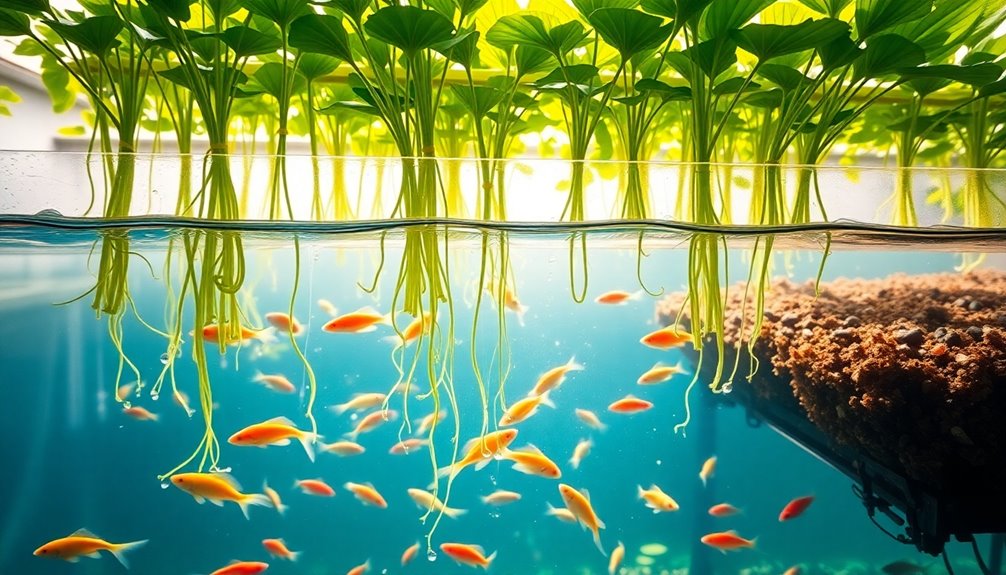
One of the most compelling advantages of aquaponics is its ability to create a sustainable ecosystem that benefits both plants and fish.
You'll find that this method not only conserves water but also promotes efficient nutrient cycling.
Here are four key benefits that might just convince you to dive into aquaponics:
- Water Efficiency: Aquaponics uses up to 90% less water than traditional farming. The closed-loop system recycles water, minimizing waste.
- Organic Growth: Since aquaponics relies on natural processes, you can grow organic produce without synthetic fertilizers or pesticides, making your food healthier.
- Symbiotic Relationships: In aquaponics, fish waste provides essential nutrients for plants. In return, plants filter the water for fish, creating a perfect balance.
- Space-Saving: Aquaponics systems can be set up vertically or in small areas, making it ideal for urban environments where space is limited.
Additionally, aquaponics can integrate with outdoor composting systems, further enhancing soil health and nutrient availability for plants.
Key Benefits of Hydroponics
When it comes to growing plants without soil, hydroponics stands out for its efficiency and effectiveness. One of the main benefits you'll notice is faster plant growth. Since nutrients are delivered directly to the roots, plants absorb them more quickly, leading to quicker harvests. You can often achieve yields up to 30% higher than traditional soil gardening.
Hydroponics also uses significantly less water. With a closed-loop system, water is recirculated, reducing waste and making it a sustainable choice for those conscious of their water usage. You'll also eliminate soil-borne pests and diseases, reducing the need for pesticides and allowing for healthier plants.
Another key advantage is space efficiency. Hydroponic systems can be set up vertically or in smaller areas, making it ideal for urban environments or places with limited land. Plus, you can grow a wider variety of plants year-round, regardless of the season.
Lastly, hydroponics allows you to have better control over nutrient levels and pH, leading to more consistent results. This precision means you can tailor your growing conditions to suit specific plants, ensuring optimal growth and flavor.
Factors to Consider When Choosing
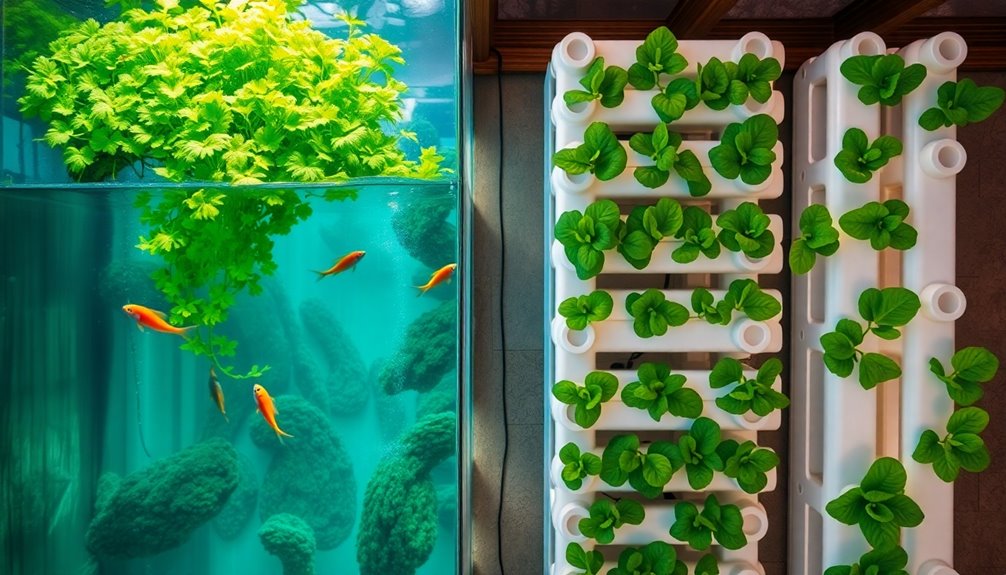
Choosing between aquaponics and hydroponics involves several important factors that can significantly impact your success as a grower.
Understanding these factors will help you make an informed decision that suits your goals and resources.
1. Space Requirements: Consider how much space you have available.
Hydroponics can work well in smaller areas, while aquaponics usually needs more room for fish tanks and plants.
2. Initial Investment: Look at your budget.
Aquaponics setups can have higher startup costs due to fish tanks and additional equipment, while hydroponics may be more affordable.
3. Maintenance: Think about how much time you can dedicate to Maintenance.
Aquaponics requires monitoring fish health and water quality, while hydroponics mainly focuses on nutrient solutions and plant growth.
4. Desired Produce: Reflect on what you want to grow.
If you're interested in fish and plants, aquaponics is a great choice. If you're solely focused on plants, hydroponics might be more efficient.
Frequently Asked Questions
What Initial Investment Is Required for Aquaponics Systems?
When considering an aquaponics system, you'll need to budget for tanks, pumps, grow beds, and fish. Initial investments can range from a few hundred to several thousand dollars, depending on the system's complexity and size.
How Do Fish Species Affect Aquaponics Productivity?
The fish species you choose directly impacts your system's productivity. Healthy, compatible fish produce waste that nourishes plants, while species that thrive in your environment can enhance growth rates and overall yield, maximizing your aquaponics success.
Can Hydroponics Be Used for Outdoor Gardening?
Absolutely! Hydroponics can dance under the sun, transforming your outdoor garden into a lush paradise. You'll enjoy vibrant plants without soil, and you'll discover a world of possibilities as you nurture your green thumbs.
What Are the Maintenance Requirements for Each System?
For both systems, you'll need to monitor water levels, pH, and nutrient concentrations regularly. Hydroponics requires more frequent nutrient adjustments, while aquaponics involves caring for fish, ensuring both plants and aquatic life thrive together.
Is Organic Certification Possible for Aquaponics or Hydroponics?
You can achieve organic certification for both systems, but it depends on specific practices and local regulations. You'll need to ensure your inputs and procedures align with organic standards to qualify for certification successfully.
Conclusion
In the grand garden of choices, whether you lean toward aquaponics or hydroponics, it ultimately depends on your goals and lifestyle. If you crave a symbiotic relationship like the tale of the tortoise and the hare, aquaponics might be your slow and steady win. But if you prefer the speed of a racecar, hydroponics could fuel your fast-paced dreams. Whichever you choose, you're diving into a world of growth and innovation, nurturing both plants and your passion.

